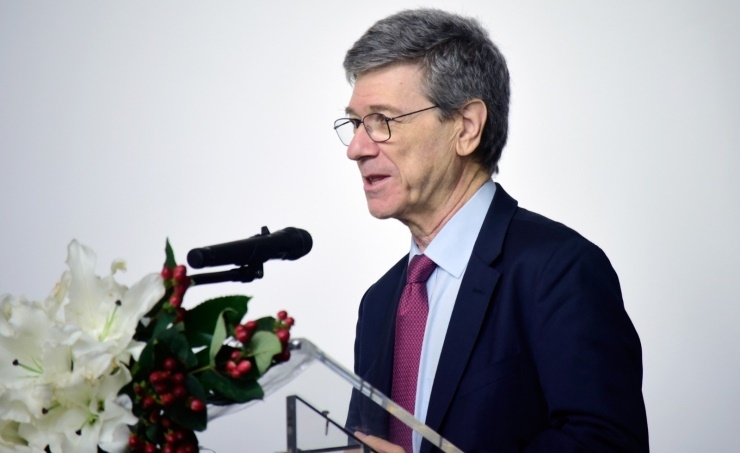HRH Premier’s efforts towards promoting world peace hailed
Professor Jeffrey David Sachs, Director of the Institute and Professor of Sustainable Development at the School of International and Public Affairs at Columbia University, has praised Bahrain’s wise policy in laying the foundations of peace and strengthening the significance of the world’s collective conscience.
Prof Sachs also pointed that Bahrain’s distinguished international level is the outcome of its realistic contributions and supportive positions in laying the foundations of international peace and security. Delivering a lecture on “Achieving sustainable development in the Middle East ... challenges and opportunities”, Prof Sachs lauded the role of His Royal Highness Prince Khalifa bin Salman Al Khalifa, Prime Minister, and his vision in promoting issues of world peace through his initiative, which was approved by the United Nations by adopting April 5 as an international day of conscience.
He expressed deep thanks and appreciation to HRH the Prime Minister for his global initiative that contributes to stimulating and encouraging international action and co-operation in the field of sustainable development. Bahrain’s efforts in achieving the sustainable development goals have made it among the pioneer countries on the path of global sustainability, he added. Prof Sachs praised the progress achieved by Bahrain at all levels and the advanced steps it has taken in implementing the goals of the 2030 sustainable development plan, which were included in the Government Action Plan for 2019-2022.
The United Nations endorsed Bahrain’s plan, he said. Prof Sachs stressed that Bahrain has made important steps and remarkable accomplishments in achieving development goals and that it is still a pioneer of change towards a green economy at the regional level. This is an essential leadership to motivate the countries of the Middle East region to emulate the Bahraini example and achieve the best in the environmental field, he added. Prof Sachs pointed out that Bahrain has a great understanding and profound awareness of the importance of maintaining the commitment to strengthening the bonds of sustainable development and its readiness to make more efforts to ensure green transformation and reduce dependence on the hydrocarbon sector in order to generate clean renewable energy and improve the lives and welfare of its citizens.
Bahrain’s readiness to lead at the level of values (tolerance, peace, security, freedom and respect for others) is not an easy matter since values do maintain the stability of the countries because of their close links to development, he added, stressing that Bahrain has come a long way in this field. In the lecture attended by Shaikh Hossam bin Isa Al Khalifa, President of HRH Prince Khalifa bin Salman Al Khalifa Award for Sustainable Development, senior officials, diplomats, academics, experts and media figures, Sachs assessed the experiences of the countries of the region in the field of sustainable development, the challenges they face in achieving the sustainable development goals 2030 approved by the United Nations, and ways of dealing with them in a manner that supports the international community’s endeavour to lay the foundations of peace, security and stability.
On the regional level, Prof Sachs stressed the importance of the countries of the Middle East and the Arabian Peninsula to optimise more than ever the utilisation of the solar energy that they possess in abundance in order to be able to reduce their great dependence on fossil fuels. He said that the situation of the region is complicated because of the dependence of the region’s budgets and wealth on the hydrocarbon sector almost entirely. In this context, he urged the countries of the region to put in place national development and environmental strategies and to implement them seriously, in addition to harnessing the best minds and advanced technologies to make the best use of solar energy as well as moving earnestly towards electrical applications such as the use of environmentally friendly electric cars. The achievement of development and the transition to green economies in the region in the desired manner requires achieving stability and sustainable peace in a way that suits the specificity and history of the area, he said.
Prof Sachs said that mankind has the knowledge, advanced technology and unprecedented capabilities which empower people to solve or address any problem they face, such as eliminating poverty, generalising health and education services and maximising the use of renewable and environmentally friendly energy through wind, solar, and hydrogen energy, especially since there are no limits to technology when it comes to achieving the sustainable development goals. However, Prof Sachs cautioned against the consequences of ignoring the environmental aspect in dealing with the challenges of pollution as well as indifference to climate change.
Related Posts

